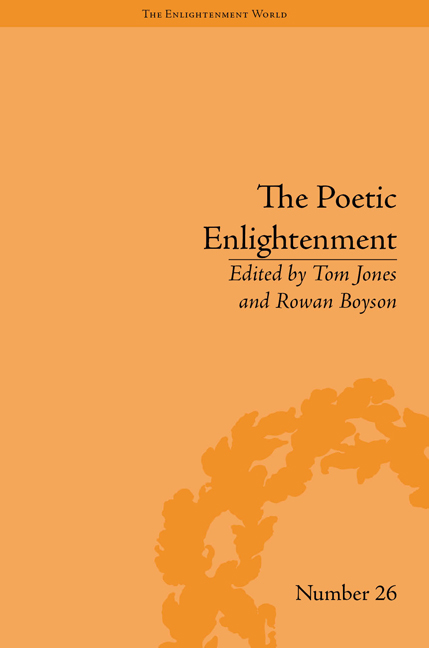Book contents
- Frontmatter
- CONTENTS
- Acknowledgements
- List of Contributors
- General Introduction
- I Poetic Knowledge and the Knowledge of Poetry
- 1 Introduction
- 2 Samuel Johnson and the Science of Literary Criticism
- 3 Prosody, Knowledge and Humanity in Enlightenment Language Science
- 4 Ferguson's School for Literature
- II Poetic Theories of the Social Self
- III Enlightenment and Romantic Poetologies
- Notes
- Index
2 - Samuel Johnson and the Science of Literary Criticism
from I - Poetic Knowledge and the Knowledge of Poetry
- Frontmatter
- CONTENTS
- Acknowledgements
- List of Contributors
- General Introduction
- I Poetic Knowledge and the Knowledge of Poetry
- 1 Introduction
- 2 Samuel Johnson and the Science of Literary Criticism
- 3 Prosody, Knowledge and Humanity in Enlightenment Language Science
- 4 Ferguson's School for Literature
- II Poetic Theories of the Social Self
- III Enlightenment and Romantic Poetologies
- Notes
- Index
Summary
Among the fields that authors of the eighteenth century attempted to improve into a system of rational principles was the criticism of literature and the other fine arts. Evidently inspired by French Enlightenment thinkers such as Voltaire, D'Alembert and Montesquieu, this project of making criticism into a science was pursued with particular enthusiasm by Scottish authors such as Alexander Gerard, Lord Kames and Hugh Blair.
According to Kames in The Elements of Criticism (1762), for example, ‘the fine arts, like morals, might become a rational science; and, like morals, may be cultivated to a high degree of refinement’. In lectures that he first delivered about the same time, Blair contended similarly that ‘there are principles of reason and sound judgment which can be applied to matters of Taste, as well as to subjects of science and philosophy’. Not all British philosophers agreed that ‘taste’ could be reduced to incontrovertible rational principles. David Hume adopted a characteristically sceptical view of abstract philosophical principles in his essay ‘Of the Standard of Taste’ (1757). In the first volume of his An Essay on the Writings and Genius of Pope (1756), Joseph Warton expressed positive hostility towards ‘that philosophical, and systematical spirit much in vogue, which has spread itself from the sciences even to polite literature’. Across a wide range of authors, however, eighteenth-century criticism was breaking away from the neo-classical belief that Aristotle and Homer exemplified, ‘Nature Methodiz'd’, turning instead to the psychological experience of reading or viewing literary art.
What was Samuel Johnson's response to the proposition that literary criticism could be made into a ‘science’, defined in his Dictionary (1755) as ‘Art attained by precepts, or built on principles’? Major figures in early twentieth-century criticism, including T. S. Eliot, F. R. Leavis and René Wellek, placed Johnson firmly in the tradition of neo-classicism. From in the 1950s, scholars began to reassess this placement, stressing Johnson's Lockean empiricism, though they continued to stress his ‘resistance to theory’.
- Type
- Chapter
- Information
- The Poetic EnlightenmentPoetry and Human Science, 1650–1820, pp. 15 - 28Publisher: Pickering & ChattoFirst published in: 2014



